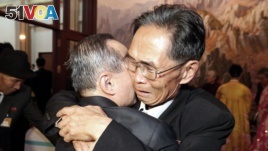18 August, 2018
After World War II, many Korean families who were North or South of the line that divided the two countries were separated.
The Korean War more than 60 years ago made meeting nearly impossible.
And now some separated families in South Korea say they are not sure they want to take part in next week's inter-Korean reunions.
The reunion for separated families will take place from August 20 to 26 in the North's Kumgang mountain resort. The reunion is one of many cooperation and exchange programs meant to aid relations between the two countries. South Korean President Moon Jae-in and North Korean leader Kim Jong Un agreed to the meetings at an inter-Korean summit in April.

North Korean Joo Jae Eun, right, hugs with his South Korean brother Joo Jae-hui in a bid farewell after the Separated Family Reunion Meeting at Diamond Mountain resort in North Korea, Monday, Oct. 26, 2015. (Kim Do-hoon/Yonhap via AP)
Fewer families members remain
This year, fewer than 100 family members from both sides will take part.
Some people are in their 80s and their family members have died.
Baik Seong-yeon is 84 years-old. She learned that her brothers and sisters in North Korea had already died after she was chosen to join the reunion for separated families.
Baik will meet with the spouses of her late brother and sister, and with a niece from the North Korean side of her family. She does not expect an emotional meeting because she does not know them.
"As I have not met them before, I do not have a personal attachment, but I think that we are blood-related," said Baik.
Years of division
Baik was born in Sunchon in the South Pyongan Province in North Korea. She fled to the South to escape the fighting during the war. She left behind her parents and siblings.
For the last 70 years, she, along with millions of others families that were separated during the fighting, was not permitted to return or contact her family. Both North and South Korea restrict communication with the other side.
The official family reunions began in the year 2000 when the South Korean government offered ways to aid the North. The offers included economic assistance, in an effort to improve relations.
But the meetings have not been held often because of tensions over the North's nuclear tests and other actions. These include an incident in which North Korea fired artillery at a South Korean border island in 2010.
So far the program has reunited only a small number of the more than 57,000 South Koreans who are registered to take part. The most recent family reunion was held three years ago.
Losing touch with family members
War survivors like 90-year-old Kang Hwa-ja, are weak and suffering from decreasing mental abilities. She lives with her daughter in Incheon and needs assistance to walk.
Kang's daughter Kim Yeon-sook said she did not ask to take part in this year's reunion. She was surprised when she was chosen. When she learned all her close relatives were dead, she was unsure if she should go.
"As they are not her direct brother or sister, there will be an emotional gap," said Kim, who will go with her mother to meet the son and daughter of Kang's brother.
Kang Hwa-ja, Baik Seong-yeon and other aging survivors have decided to go so they can learn how their relatives lived and died in the North. They say they consider it a chance to say goodbye.
"When we meet, we will talk about what happened in the past. It probably will be the first and the last time," said Baik.
I'm Susan Shand.
This story was reported by VOA's Brian Padden. Susan Shand adapted it for Learning English. Mario Ritter was the editor.
_____________________________________________________________
Words in This Story
reunion – n. rejoining two things or people or groups
resort – n. a place for a vacation or holiday
spouse – n. a husband or a wife
niece – n. the daughter of a brother or sister
sibling – n. a brother or sister
gap – n. an unfilled space